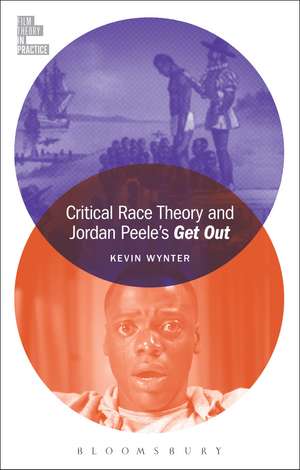Critical Race Theory and Jordan Peele's Get Out: Film Theory in Practice
Autor Kevin Wynteren Limba Engleză Paperback – 18 mai 2022
| Toate formatele și edițiile | Preț | Express |
|---|---|---|
| Paperback (1) | 106.07 lei 3-5 săpt. | +32.41 lei 4-10 zile |
| Bloomsbury Publishing – 18 mai 2022 | 106.07 lei 3-5 săpt. | +32.41 lei 4-10 zile |
| Hardback (1) | 373.72 lei 6-8 săpt. | |
| Bloomsbury Publishing – 18 mai 2022 | 373.72 lei 6-8 săpt. |
Preț: 106.07 lei
Preț vechi: 130.29 lei
-19% Nou
Puncte Express: 159
Preț estimativ în valută:
20.30€ • 21.25$ • 16.79£
20.30€ • 21.25$ • 16.79£
Carte disponibilă
Livrare economică 17-31 martie
Livrare express 28 februarie-06 martie pentru 42.40 lei
Preluare comenzi: 021 569.72.76
Specificații
ISBN-13: 9781501351297
ISBN-10: 150135129X
Pagini: 200
Dimensiuni: 127 x 197 x 17 mm
Greutate: 0.21 kg
Editura: Bloomsbury Publishing
Colecția Bloomsbury Academic
Seria Film Theory in Practice
Locul publicării:New York, United States
ISBN-10: 150135129X
Pagini: 200
Dimensiuni: 127 x 197 x 17 mm
Greutate: 0.21 kg
Editura: Bloomsbury Publishing
Colecția Bloomsbury Academic
Seria Film Theory in Practice
Locul publicării:New York, United States
Caracteristici
Surveys the central problems and questions at the intersection of contemporary critical race theory and film studies
Notă biografică
Kevin Wynter is Assistant Professor of Media at Pomona College, USA. Articles on screen violence, horror, and pornography have appeared in Journal of Cinema and Media Studies, Cineaction, and the anthology Transnational Horror Cinema: Bodies of Excess and the Global Grotesque. His current book project is titled Feeling Absence: Theory of the Horror Film.
Cuprins
Acknowledgements IntroductionSection 1: Critical Race TheorySection 2: Critical Race Theory and Jordan Peele's Get OutConclusionFurther ReadingSuggested Films and MediaIndex
Recenzii
Get Out. Candyman. The Sunken Place. The "Final Brother." Wynter presents a pedagogical masterpiece that explores legacies of anti-Black violence at the intersections of horror films and critical race theory. Wynter's brilliance is on full display in this exquisitely written book. In fastening the theoretical and artistic to each other, he centers Black articulations of oppression at a time when it is most politically urgent.
Both a primer in critical race theory and an exemplary work of cinematic close reading, Wynter makes a convincing case for Get Out as a film that short-circuits everything we thought we knew about the horror genre. Jordan Peele's film, Wynter contends, is neither speculative nor allegorical but is rather a rigorously realistic portrayal of Black experience in the "traumatic present." Critical Race Theory and Jordan Peele's Get Out offers an indispensable elaboration of the intersection between critical race theory and film.
Conceptually rich, lucid, as timely and as harrowing as Get Out itself, Kevin Wynter's compelling text puts Critical Race Theory and Peele's film in a mutually illuminating dialog that fully does justice to both. Wynter mines the tension between history and ontology with rigor and elegance, giving full weight to pessimism but also insisting on the fundamental challenge CRT and Get Out leave us with: to ask, impossibly, how could things be otherwise, in the wake of slavery and racist violence?
Both a primer in critical race theory and an exemplary work of cinematic close reading, Wynter makes a convincing case for Get Out as a film that short-circuits everything we thought we knew about the horror genre. Jordan Peele's film, Wynter contends, is neither speculative nor allegorical but is rather a rigorously realistic portrayal of Black experience in the "traumatic present." Critical Race Theory and Jordan Peele's Get Out offers an indispensable elaboration of the intersection between critical race theory and film.
Conceptually rich, lucid, as timely and as harrowing as Get Out itself, Kevin Wynter's compelling text puts Critical Race Theory and Peele's film in a mutually illuminating dialog that fully does justice to both. Wynter mines the tension between history and ontology with rigor and elegance, giving full weight to pessimism but also insisting on the fundamental challenge CRT and Get Out leave us with: to ask, impossibly, how could things be otherwise, in the wake of slavery and racist violence?













